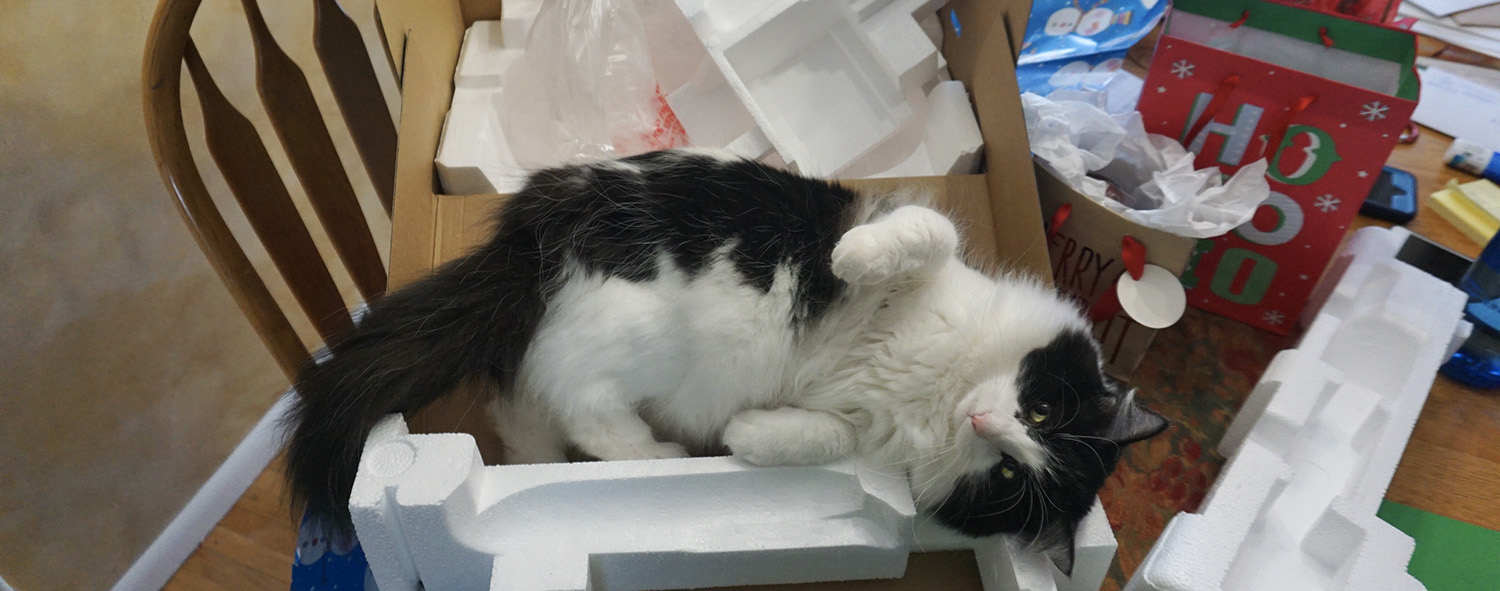“Our age is becoming more complex and diffusely overloaded, and simplicity is a movement whose time has come.”
—Richard Swenson, Margin (Colorado Springs: NavPress, 2004), p. 180.
“It is no bad thing to celebrate a simple life.”
—Biblo Baggins, The Lord of the Rings: The Fellowship of the Ring (2001)
I am a life-long “Messy.” Synonyms could include the terms Clutterbug, Sloppy Joe, Pile-Lover, Blind-to-Disorder, etc. I’m actually forced by my role in the company to be a #1 Worker—namely, to see what needs to be done and then do it, such as often cleaning up the last vestiges of beverage bottles scattered around the JugCave or putting away props which rolled under the couch. But at home, I confess to remaining an expert at avoiding my own messes even after nearly 27 years of marriage. I have proven to be a trainable husband, but it’s far from my first thought to follow through with any given messes. Rather, I create most of them! Like my mom, people and reading time come before running a clean house or work area, and I acknowledge that repenting of my Messy tendencies has been a lifelong struggle.
The paper trails, dishes, laundry, discarded electronics and overflowing junk drawers in (presumably) each of our homes are indicative of the clutter that often distracts us from running more orderly lives. We long for simplicity, but it takes a lot of discipline to foster a lifestyle that is free of, or at least greatly reduced in, clutter in the areas of the physical, emotional, financial, and time reserves we need in our lives.
In my annual emergence from the cocoon that is commonly known as Winter Break, I’ve made two poignant observations about simplicity from very different sources: The Sermon on the Mount, and Chip, our Super-Cat.
Any pet owner will acknowledge that our furry, finny or feathery friends (whether canine, feline, rodent, fish, or fowl) have remarkably simple needs. Because we have the blessing of sharing a home office, Wendy & I are able to spend many hours with Chip on a weekly basis. On his most fulfilling day, Chip will sleep for about 14 hours (often on the lap of whoever is working at the computer), eat three well-regulated meals, stare out the sliding glass doors looking for potential prey, maybe go outside with his harness and leash when the weather is above freezing, actively play with us for perhaps 30 minutes a day, and occasionally get extra treats when learning new tricks or performing for guests. Sleep, tricks, eat, play, groom, sleep, outside, eat, repeat. As long as we do our part with thrice daily feedings, daily litter box maintenance, and actively playing with him, he’s content. (Although he probably thinks that we don’t play with him nearly often enough.)
Of course, we humans have a much higher calling and purpose to our lives, but I believe we can learn lessons from our pets. While dogs understandably get most of the press about being unconditional companions, emotionally expressive, and intensely loyal, our experience with Chip is that he is quite content with a very simple lifestyle, even though we make him do tricks for food, disallow him roaming the house while we sleep, and prevent him being outside unleashed. Frankly, my compassion for our three-year-old feline and his well being and quality of life causes me to reflect on whether or not my own priorities are too complicated rather than more simplified.
Just this week, my daily Bible readings had me in Matthew 6. The action-doctrines of giving, praying, fasting, stewarding, and trusting highlight that middle chapter in the most famous of sermons, and the last section was particularly precious to me in 1992. I was a recent college graduate unwilling to relocate to pursue an elusive career in radio. Therefore, I spent February through May of that year seeking a new career direction while working a temp. job, delaying engagement to Wendy, and longing to move out of my collegiate apartment. During that precious time of simply but earnestly seeking the Lord for my life, Jesus’ words landed on me profoundly as He taught about fulfilling our need for the basic necessities of food and clothing: “But seek first the kingdom of God and his righteousness, and all these things will be added to you” (Matt. 6:33, ESV). My takeaway as a 22-year-old was that I needed to be content in God before I was ready for a career, a wife, and a home. The Apostle Paul echoed Jesus’ words when he wrote, “But godliness with contentment is great gain, for we brought nothing into the world, and we cannot take anything out of the world. But if we have food and clothing, with these we will be content” (1 Timothy 6:6-8, ESV).
Far beyond the basic necessities outlined above, we as a human race are often quickly dissatisfied with the simple gifts of basic needs, purpose, and relationships. Materialism seems to always rear its ugly head, regardless of a person’s means. During the years after I resigned from childcare management to run JUGHEADS as an independent company, taking a 50% cut in pay and practicing more frugality than usual, I read an insightful book entitled Simplify Your Life. Regarding the messy tendencies of material things, the author quoted from a 1993 book called Downscaling: “Did you ever consider that there may be a correlation between the accumulation of things and our frantic lifestyle? We are so used to buying whatever we want, even if only on a small scale, that denying ourselves seems unthinkable. The busier we are, the less time we have to consider creative alternatives. It is easier to plunk down dollars or a credit card as we rush to the next activity than to evaluate the necessity of our next purchase” (H. Norman Wright, Simplify Your Life and Get More Out of It, Wheaton, IL: Tyndale House Publishers, Inc., 1998, p. 132).
Richard Swenson is even more succinct as he addresses material possessions in light of the noble goal of simplicity: “Simplicity does not reject money and ownership—it merely subjugates it” (Margin, 2004, p. 175).
Do I live in a fantasy world where bills, broken relationships, geopolitical strife, health struggles, and personal fulfillment aren’t stark realities? No, but I try to wisely heed the message of simplicity even amidst life’s inevitable conflicts, questions, and pain.
As we enter the full swing of 2020 and a new decade, we all would be wise to practice simplicity whenever possible. Even with all of the world’s problems, not to mention our individual, familial, and cultural struggles, the message of simplicity is sorely needed today. Just consider the last three SLT columns, where Lizzy, Nathan and Aedan shared their perspectives on the simple essence of what a Jughead’s membership offers: kindness, individuality, respect, community, and vulnerability. Coach Erica’s October column touched on Maslow’s hierarchy of needs, resonating (for its part) with The Sermon on the Mount. Simplicity takes discipline, self-denial, and delayed gratification. When practiced, its fruits include peace, creativity, contentment, and availability to love and serve others.
Here’s to a paradoxical 2020 of profound and fruitful simplicity.

